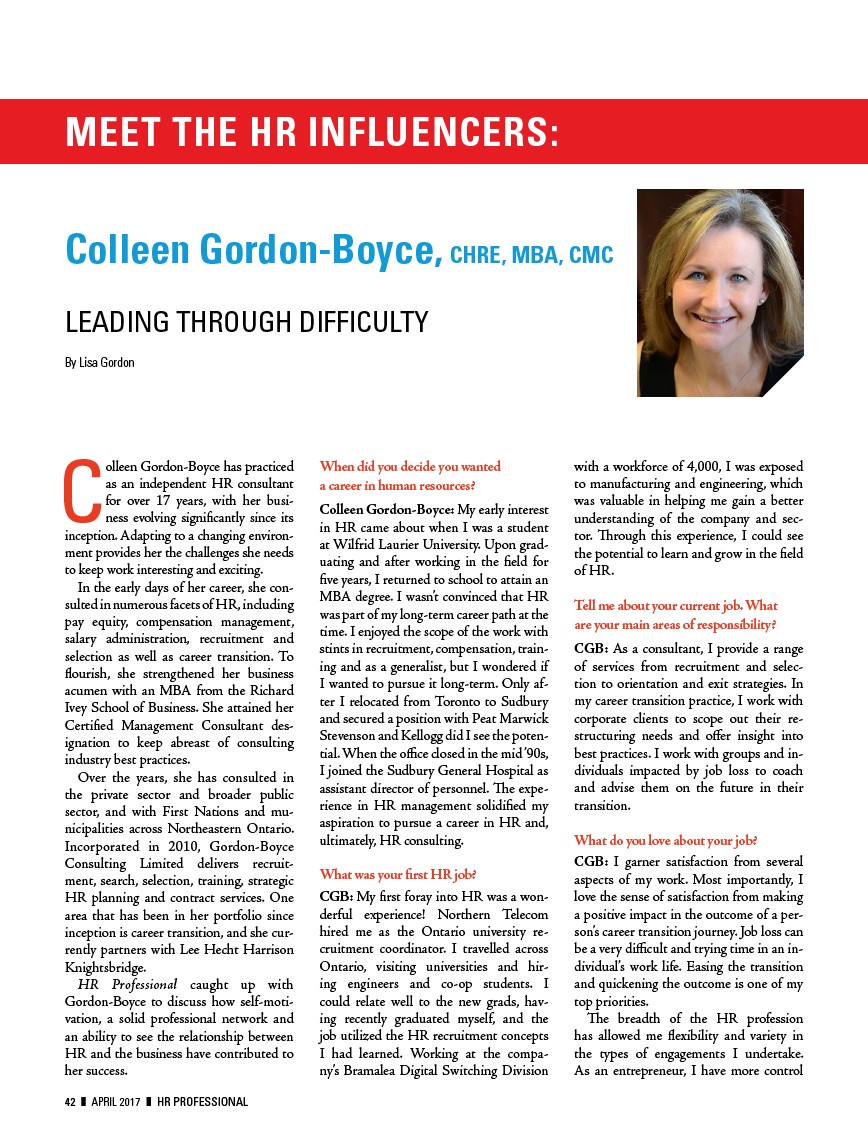
MEET THE HR INFLUENCERS:
Colleen Gordon-Boyce, CHRE, MBA, CMC
LEADING THROUGH DIFFICULTY
By Lisa Gordon
Colleen Gordon-Boyce has practiced
as an independent HR consultant
for over 17 years, with her busi-ness
evolving significantly since its
inception. Adapting to a changing environ-ment
provides her the challenges she needs
to keep work interesting and exciting.
In the early days of her career, she con-sulted
in numerous facets of HR, including
pay equity, compensation management,
salary administration, recruitment and
selection as well as career transition. To
flourish, she strengthened her business
acumen with an MBA from the Richard
Ivey School of Business. She attained her
Certified Management Consultant des-ignation
to keep abreast of consulting
industry best practices.
Over the years, she has consulted in
the private sector and broader public
sector, and with First Nations and mu-nicipalities
across Northeastern Ontario.
Incorporated in 2010, Gordon-Boyce
Consulting Limited delivers recruit-ment,
search, selection, training, strategic
HR planning and contract services. One
area that has been in her portfolio since
inception is career transition, and she cur-rently
partners with Lee Hecht Harrison
Knightsbridge.
HR Professional caught up with
Gordon-Boyce to discuss how self-moti-vation,
a solid professional network and
an ability to see the relationship between
HR and the business have contributed to
her success.
When did you decide you wanted
a career in human resources?
Colleen Gordon-Boyce: My early interest
in HR came about when I was a student
at Wilfrid Laurier University. Upon grad-uating
and after working in the field for
five years, I returned to school to attain an
MBA degree. I wasn’t convinced that HR
was part of my long-term career path at the
time. I enjoyed the scope of the work with
stints in recruitment, compensation, train-ing
and as a generalist, but I wondered if
I wanted to pursue it long-term. Only af-ter
I relocated from Toronto to Sudbury
and secured a position with Peat Marwick
Stevenson and Kellogg did I see the poten-tial.
When the office closed in the mid ’90s,
I joined the Sudbury General Hospital as
assistant director of personnel. The expe-rience
in HR management solidified my
aspiration to pursue a career in HR and,
ultimately, HR consulting.
What was your first HR job?
CGB: My first foray into HR was a won-derful
experience! Northern Telecom
hired me as the Ontario university re-cruitment
coordinator. I travelled across
Ontario, visiting universities and hir-ing
engineers and co-op students. I
could relate well to the new grads, hav-ing
recently graduated myself, and the
job utilized the HR recruitment concepts
I had learned. Working at the compa-ny’s
Bramalea Digital Switching Division
with a workforce of 4,000, I was exposed
to manufacturing and engineering, which
was valuable in helping me gain a better
understanding of the company and sec-tor.
Through this experience, I could see
the potential to learn and grow in the field
of HR.
Tell me about your current job. What
are your main areas of responsibility?
CGB: As a consultant, I provide a range
of services from recruitment and selec-tion
to orientation and exit strategies. In
my career transition practice, I work with
corporate clients to scope out their re-structuring
needs and offer insight into
best practices. I work with groups and in-dividuals
impacted by job loss to coach
and advise them on the future in their
transition.
What do you love about your job?
CGB: I garner satisfaction from several
aspects of my work. Most importantly, I
love the sense of satisfaction from making
a positive impact in the outcome of a per-son’s
career transition journey. Job loss can
be a very difficult and trying time in an in-dividual’s
work life. Easing the transition
and quickening the outcome is one of my
top priorities.
The breadth of the HR profession
has allowed me flexibility and variety in
the types of engagements I undertake.
As an entrepreneur, I have more control
42 ❚ APRIL 2017 ❚ HR PROFESSIONAL